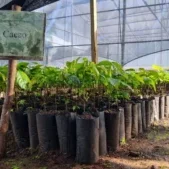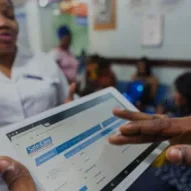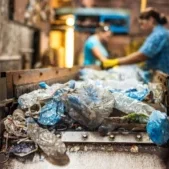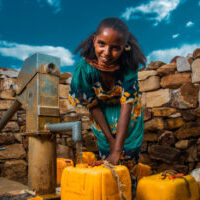
Empowering Female Entrepreneurship in Tech and Agriculture
In April 2024, TRAIDE Foundation, in collaboration with Ice Addis, Studio.Why, ITC, Care Ethiopia, and UN Women, hosted the Women in Tech Hackathon in Addis Ababa. The event brought together 23 young women to tackle key challenges in Ethiopia’s agricultural sector through technology and entrepreneurship. Over the course of three days, participants developed sustainable, market-driven solutions aimed at advancing the Sustainable Development Goals (SDGs), particularly poverty (SDG1), zero hunger (SDG2), gender equality (SDG 5), and climate action (SDG 13).
How the Women in Tech Hackathon came to life
The Hackathon was part of TRAIDE Foundation’s mission to accelerate digitalization across Ethiopia by fostering innovation and collaboration. To kickstart this initiative, we hosted the ‘Digitalization in Ethiopia, Talent & Entrepreneurship’ webinar, bringing together key stakeholders to uncover opportunities in the country’s digital landscape. Collaborations with STUDIO.WHY and IceAddis emerged from this initiative, setting the stage for the Hackathon. What began as an idea quickly evolved into a key effort to empower women and address the barriers faced in tech and agriculture.
Tackling critical issues in Ethiopia’s agriculture and tech sector
The Hackathon sourced key challenges affecting smallholder farmers from partners such as the International Trade Centre, Ice Addis, the International Water Management Institute (IWMI) and Lersha. Each case focused on agricultural challenges where digital solutions could make a significant impact.
The challenges included:
- Climate resilience for smallholder farmers: With over 24 million Ethiopian farmers relying on rain-fed agriculture, climate-related risks such as droughts and pests are a major concern. Teams developed solutions to promote climate insurance adoption, offering a safety net for farmers facing unpredictable conditions.
- Enhancing supply chain traceability: Ethiopian coffee farmers, particularly smallholders, struggle with fragmented supply chains that hinder their access to fair markets and equitable pricing. Over 95% of Ethiopia’s coffee production comes from smallholder farms, each typically less than one hectare in size. Participants worked on solutions that can improve traceability, allowing smallholder coffee farmers to access better markets and achieve fairer prices.
- Digital infrastructure for e-commerce: In Ethiopia, only 20% of rural communities have reliable internet access, which limits farmers’ ability to connect with broader markets through e-commerce and digital literacy. Teams sought to bridge this digital divide by developing tools to connect farmers to wider markets, thus expanding their economic opportunities.

Hackathon Highlights and Impactful Solutions
Over three days, Hackathon participants tackled key challenges through hands-on activities and collaboration. They started by meeting challenge owners, who presented issues in agriculture and tech, followed by Q&A sessions for deeper understanding. Expert-led masterclasses by Marleen Honders and Mark Herberts guided participants in refining their approaches, using design thinking methods and tools like Lego modeling, brainstorming, and prototyping. Teams worked together to develop and prioritize solutions, culminating in final pitches to judges that highlighted their progress and ideas.

Among the participants in the hackathon, the Yanosats team won first place and a $1,500 prize for their innovative traceability platform that centralizes data on Ethiopian coffee farmers, including demographics, farm locations, and production details. This solution enhances transparency across the coffee supply chain, empowering farmers with better pricing opportunities and fostering trust among stakeholders. Team Leilt secured second place with a $1,000 prize for their drone-based platform, which combines real-time crop monitoring, digital training programs, and a centralized database to promote climate insurance adoption among farmers.
In the months following the Hackathon, TRAIDE has facilitated ongoing support, which includes coaching and access to a grant for the winning teams. These efforts aim to help these novice entrepreneurs further develop their solutions.

TRAIDE’s model: Building partnerships to stimulate private sector development
The success of this Hackathon reflects TRAIDE Foundation’s collaborative partnership-building approach to create impact through sustainable private sector development. Together with private sector actors, we identified an opportunity to stimulate entrepreneurship and develop business solutions to address development challenges. We built a partnership in which each organization brought unique expertise that enriched the event’s outcomes: Ice Addis organised participant recruitment and event logistics, STUDIO.WHY provided cutting-edge design thinking methodologies, ITC, IWMI, and Lersha shared real-world challenges for the participants to address, and UN Women and CARE provided funds for organizing the event and offering the winners prototype vouchers.
Beyond partnership building, TRAIDE also acted as the partnership coordinator, ensuring seamless collaboration between organizations, aligning efforts towards the Hackathon’s goals, and managing the integration of resources and expertise for maximum impact.
Creating a sustainable ecosystem for agricultural development
The Women in Tech Hackathon supports TRAIDE’s mission of fostering local entrepreneurship and innovation in Ethiopia. The initiative not only provided technical skills and innovative solutions but also built valuable networks and instilled confidence in the participants. By equipping women with the tools to address local challenges, we are empowering the next generation of leaders who will drive sustainable change in Ethiopia.
“This experience has given me the tools I need to create change not only for myself but for my entire community.” – Hackathon participant
Scaling up agripreneurship
TRAIDE is collaborating with the Food and Agriculture Organisation (FAO) and the Netherlands Enterprise Agency (RVO) to set up an agripreneurship program in Ethiopia. Drawing on our experiences from the Hackathon, our knowledge of the agriculture sector, and our study of the entrepreneurship ecosystem in Ethiopia, we are advising on the development of an incubation program for young agripreneurs. The aim is to collaborate with existing agribusinesses and identify sectoral challenges that new entrepreneurs can help address.
Would your agribusiness be interested in collaborating on this initiative by providing case studies? Or does your organization work on entrepreneurship development, and would you like to learn more about our program? Please contact us at ethiopia@traide.org.









